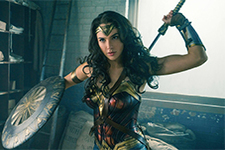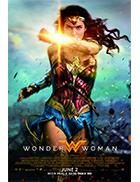Wonder Woman
|  Patty Jenkins’s Wonder Woman is the best superhero movie since Sam Raimi’s first two entries in the Spider-Man franchise (2002, 2004) and Christopher Nolan’s Dark Knight trilogy (2005–2012), although the film to which it harkens back with the most relevance is Richard Donner’s Superman (1978). Like that film, Wonder Woman is an exuberant fantasy with a genuine conscience that stands apart from so many other similar films in its willingness to embrace goodness, decency, and an unironic belief in the power of love. Like Christopher Reeve’s decidedly human and humane Man of Steel (as clear a Christ figure as has ever graced the silver screen), Gal Gadot’s superpowered Amazon searches for the inherent goodness among mortals and finds that the results are decidedly mixed: There is good, but there is also a whole lot of evil, and she utilizes her heightened physicality and moral understanding as a catalyst for betterment, rather than for grandstanding superiority (a lesson a lot of people in power these days would do well to heed). The trend over the past decade has been to present superheroes as tortured and morally conflicted; this was the primary fuel of Nolan’s Dark Knight films, as well as fan favorite Wolverine in the X-Men franchise, and billionaire egoist Tony Stark in Iron Man and The Avengers series. In this regard, Wonder Woman is a refreshing change of pace because it presents us with a hero with a clear sense of both mission and morality, and even though she discovers that both are not nearly as clear-cut as she originally thought, she never lets the darkness consume her (which was the primary theme of the Zack Snyder’s emotionally dull, visually overstuffed Batman v Superman: Dawn of Justice, the film that first introduced Gadot’s Wonder Woman a year ago). Her emotional and moral trajectory takes her from a simplistic and somewhat naïve view of good and evil to a more profound understanding of the dichotomous, conflictive nature of human existence, but without ever sacrificing her empathy and willingness to believe in the human capacity for love. The screenplay by television writer/producer Allan Heinberg (Party of Five, The Catch), from a story he concocted with Zack Snyder and Jason Fuchs (Pan), takes a fairly conventional approach in recounting Wonder Woman’s origin story. Born to an all-female utopia on the hidden island of Themyscira, Diana grows up watching the Amazon women around her constantly readying themselves for battle. The mythology as relayed to her by her mother, the queen Hippolyta (Connie Nielsen), asserts that the Amazons were instructed by the god Zeus to protect the world from the nefarious interventions of Ares, the god of war. Diana is trained by the Amazon’s greatest warrior-general, Antiope (Robin Wright), and it is suggested from early on that she has special powers above and beyond the superhuman strength of the other Amazons. The outside world circa 1918 intrudes in the form of Captain Steve Trevor (Chris Pine), an American pilot and spy who crashes his plane in the waters just off the coast of Themyscira while trying to escape the German army, from which he has stolen valuable plans for a new poisonous chemical agent. Steve is, like Diana, steadfast in his sense of right and wrong (when asked who he is, he says he’s a “good guy” and, pointing at the encroaching Germans, says they are “the bad guys”) and resolutely determined to do anything he can to end the war. Diana recognizes the horrors World War I, which has literally consumed the entire world (“the war to end all wars,” as Steve puts it), and she is intent in going with him into the realm of mankind in order to stop it. She fervently believes that Ares is behind the war, and if she can kill him with a sword known as “the God Killer” that was gifted directly to the Amazons by Zeus, then she can end the war. Steven, skeptical of the mythological underpinnings of Diana’s obsession, is more focused on the practical aspect of stopping the nefarious German general Ludendorff (Danny Huston) and his chemist-henchwoman Dr. Maru (Elena Anaya), whose damaged face is partially hidden behind a Phantom of the Opera-esque prosthetic, from finalizing and deploying a hideous new chemical weapon. Patty Jenkins—who hasn’t directed a theatrical feature since Monster (2003), which won Charlize Theron an Oscar for her portrayal of serial killer Aileen Wurnos, but has remained busy in the world of television—doesn’t do anything particularly new or unique, but she deploys all the expected visual flourishes of the superhero genre in a way that is consistently gripping without being overly flashy, compelling without being exhausting. She is particularly fond of using “bullet time” to slow down the hectic action so we can admire the characters in various poses, which both harkens back to how thrilling the static nature of an iconic image can be and emphasizes the difference between the human and the superhuman. Diana and Steve work with a ragtag team comprised of a con artist named Sameer (Saïd Taghmaoui), a Scottish sharpshooter named Charlie (Ewen Bremner), and a Native American smuggler named Chief (Eugene Brave Rock), and the film manages a nice balancing act in emphasizing Diana’s physical superiority while also giving the mortals their due (in one of the film’s most ecstatic moments, Steve and the others use a blown-off tank door as a launching pad for Diana to leap into a church tower and take out a sniper). Like Captain America: The First Avenger (2011), the film’s setting in the past gives it a unique visual and tonal quality, playing off familiar historical images and historical-movie tropes. Diana’s revelatory moment as Wonder Woman, in which she shakes off the restrictive clothes of the day to first reveal her red-blue-and-gold Amazon armor, happens as she climbs out of a trench and strides confidently into the brutal No Man’s Land, inviting a hail of German bullets while Rupert Gregson-Williams’s score, laced with a sharp electric guitar howl, builds to a crescendo. It’s the kind of entrance that makes you want to stand up and cheer. And, while Gadot’s performance ensures our recognition of Diana’s immense power, she also brings the character constantly down to earth, reminding us with no small amount of poignancy that she is a stranger in a strange land—like Superman, an alien of sorts who can blend in with humanity, but only so much (multiple characters refer to the statuesque Diana’s drawing attention to herself just by being there). There are moments of sublime comedy when Diana first arrives in war-time London (“It’s hideous,” she says) as she negotiates restrictive women’s fashions, revolving doors, and the misogynistic assumed privilege of powerful men in wood-paneled offices, including Sir Patrick (David Thewlis), a British parliamentarian intent on achieving armistice at all costs. Unlike so many superhero movies, including the recently released Spider-Man: Homecoming, the humor in Wonder Woman isn’t snarky or ironic or self-consciously hip; instead, it’s classical in its emphasis on oppositions and culture conflict, never so much as in the scene in which Diana invites Steve to sleep next to her, an innocent gesture that he is initially reluctant to accept due to social norms and that eventually leads to a discussion of sex that concludes with Diana’s informing Steve that men are essential for procreation, but are unnecessary for the pleasures of the flesh. In this scene and in others, Steve is essentially the straight man, but Pine, who has blossomed into an actor of impressive range, never allows the character to become an afterthought even as he constantly works in Gadot’s shadow. She is the star of the show, but the show works because she is a star with whom we can identify and admire. Wonder Woman maintains a real sense of human emotion; the action is scaled to grandiose proportions, but it is held aloft by an underlying structure build out of empathy, idealism, and connection. The immense and impressive pyrotechnics are just the visual embodiment of what the characters are feeling, a crucial distinction that makes Wonder Woman not just a superhero movie, but a human movie. Copyright © 2017 James Kendrick Thoughts? E-mail James Kendrick All images copyright © Warner Bros. / DC Films |
Overall Rating: 


 (3.5)
(3.5)


